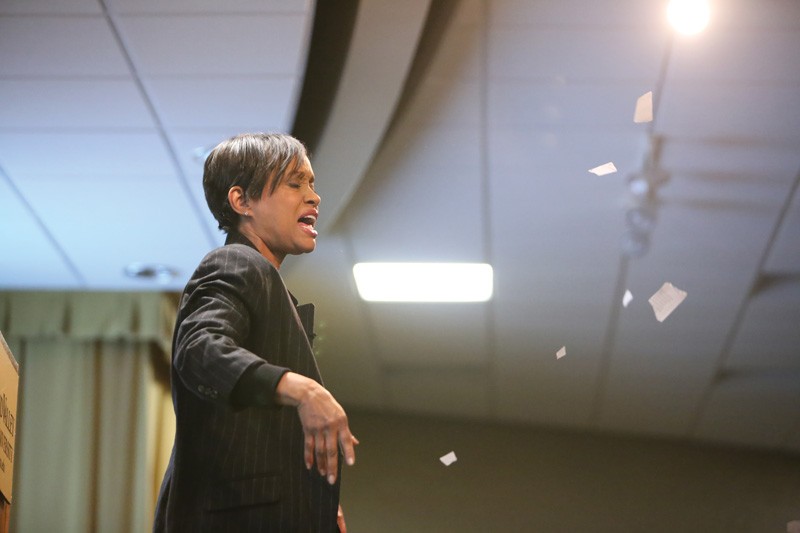Hatchett: MLK a human hero, global hero

GVL / Robert Mathews Judge Glenda Hatchett, keynote guest for Monday’s King celebration, speaks in the Grand River Room in Kirkhof.
Jan 24, 2013
The question is not “What would King do,” Judge Glenda Hatchett said to the Grand Valley State University community during Monday’s Martin Luther King Day keynote address. “The question is, ‘What are we prepared to do with purpose and passion and dignity and respect for one another?’”
The Kirkhof Center’s Pere Marquette Room was equipped to host between 400 and 500 people, but as students, faculty and administrators flooded in from the Silent March and other events, many were forced to stand along the walls and even out in the hall to hear Hatchett speak.
“What a joyous time in the nation—in the world—as we gather in what I believe is our journey now for the beloved community,” Hatchett said. “Dr. King did not see the realization for that beloved community, but it is within our reach.”
The judge, who played music with King’s children growing up, mentioned often her inability to understand the racial struggles as a child, but only through her “adult eyes” can appreciate King’s legacy.
“He was born at a time when the vast majority of the world didn’t expect much—really, many didn’t expect anything—of a little colored boy born in the deep South,” she said. “Destiny saw it differently. Destiny called for a higher expectation and a marvelous outcome of this little boy being born into the world. So, as destiny would have defined it, Martin Luther King defied all expectations and he was set out on what I call a mission of mercy, not just to liberate people of color, but rather to liberate the hearts and souls of all people.”
Calling people to celebrate his legacy, Hatchett advised listeners to pursue justice by focusing less on tolerating those who are different and more on understanding them.
“Tolerance (means) I’m just putting up with you,” she said. “Understanding means that I am making an effort to connect with you. I am making an effort to know who you are, to know you as a person, to understand because we are different. And once we understand our differences and we understand we’re all bringing special things to this beloved community, to this table, we are going to be in a better position, because I can learn from you.”
Hatchett also drew on her experiences as a judge to suggest a continuation of King’s mission in Michigan today. Throughout her career, she has seen American youth stuck in the economic cycle of their parents, where a poor education led into a poor future. Thus, she noted that education lies at the root of justice and must be improved.
Hatchett also recalled her own formal learning experience with torn, hand-me-down books. When she, as a first grader, requested new books, she was told that black students couldn’t have them. To compensate, her father told her to take out her crayons and write her own story, and that’s the message she passed on to the GVSU community.
“It is about challenges,” Hatchett said. “When you get to a rough place in your life—and in life’s book there are going to be some torn pages—you are not to give up.”
The judge closed with a challenge.
“You go home and you write your own story because it’s not about what King would do,” she said. “It’s about what we’re expected to do here and now to build a beloved community.”






















